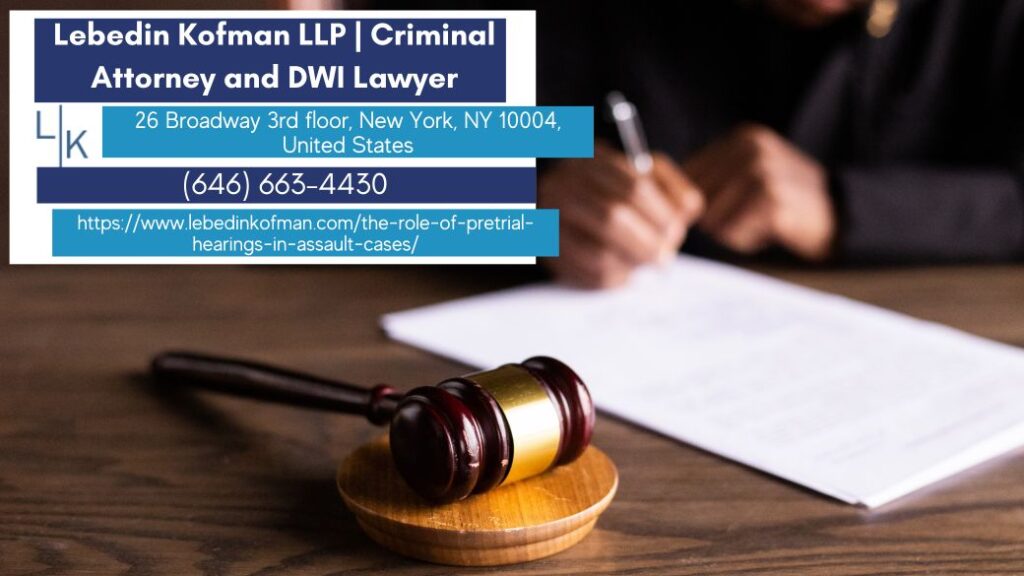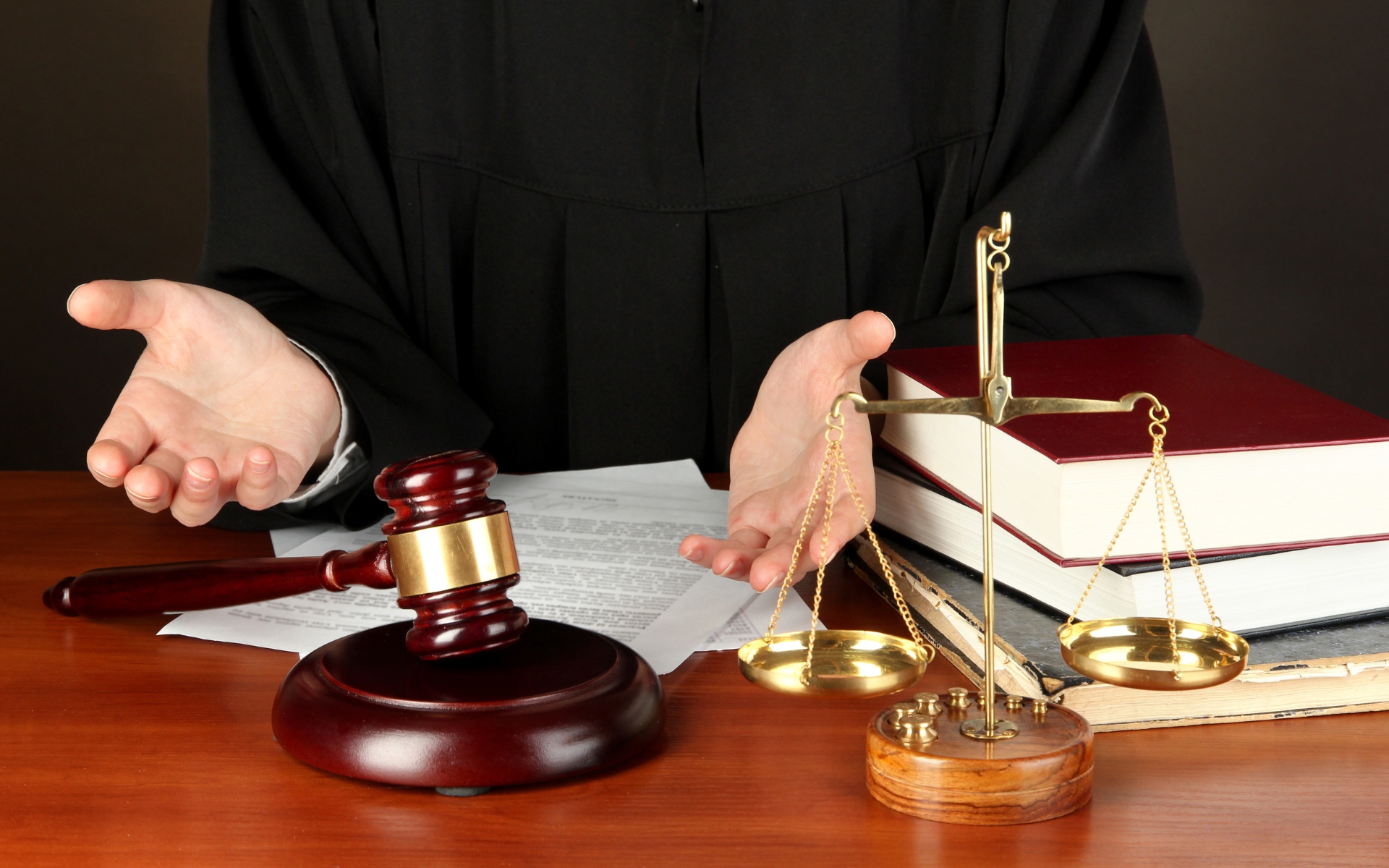In the complex legal landscape of New York, understanding the nuances of pretrial hearings in assault cases is crucial for anyone facing such charges. These hearings play a pivotal role in evaluating the evidence presented by both the prosecution and defense, determining the course of the criminal case, and offering opportunities for defense attorneys to negotiate terms. For defendants, a well-navigated pretrial phase can lead to reduced charges, case dismissal, or more favorable plea agreements. It is essential for those involved to grasp how these hearings can shape their future and the potential legal repercussions they face.
If you are facing assault charges in New York, seeking knowledgeable legal guidance is essential. At Lebedin Kofman LLP, our New York assault attorneys are well-versed in the state’s criminal justice system and are committed to advocating for your rights and achieving the best possible outcome. Contact us today at (646) 663-4430 to schedule a consultation and learn how we can guide you through each stage of your legal journey, starting with the critical pretrial hearings.
Understanding Pretrial Hearings in Assault Cases
Pretrial hearings play a critical role in the judicial process, particularly in the context of assault cases in New York. These hearings serve as a preliminary yet crucial juncture, where significant decisions about the case are made, often shaping the course of the trial and its overall outcome. Below, we discuss what pretrial hearings entail, their primary objectives, and the specific legal framework that governs them in New York.
Definition of Pretrial Hearings in the Context of Assault
In New York, a pretrial hearing in an assault case is a legal proceeding that occurs before the actual trial. This hearing is typically initiated through formal written motions which often receive consent from the prosecution. During a pretrial hearing, the court evaluates these motions to decide which specific hearings are necessary to further explore the issues of the case. This allows both the defense and the prosecution to address various procedural and substantive issues related to the case. The issues include the admissibility of evidence, compliance with discovery obligations, and other legal motions are typically discussed and resolved.
Key Objectives of Pretrial Hearings
The objectives of pretrial hearings in assault cases are multifaceted, aiming to streamline the upcoming trial and protect the legal rights of all involved parties. Key objectives include:
- Evaluating the Case: Pretrial hearings serve as a platform for the court to assess the current status of the case and determine the readiness of the parties for trial.
- Clarifying Legal Issues: These hearings help address and resolve legal questions that could affect the trial, such as the admissibility of certain pieces of evidence or the legality of the arrest and evidence collection.
- Facilitating Settlements: Often, pretrial hearings offer a venue for discussing potential plea bargains or other forms of settlement. This can sometimes result in resolving the case without the need for a full trial.
Legal Framework Governing Pretrial Hearings in New York
In New York, pretrial hearings in assault cases are governed by a combination of state statutes, case law, and court rules. Key legal provisions include:
- Criminal Procedure Law (CPL): New York’s CPL outlines the procedures for criminal cases, including the rights to motions for suppression of evidence, discovery obligations, and other pretrial motions.
- Case Law: Decisions from the New York Court of Appeals and other appellate courts provide guidance on interpreting CPL and dictate the conduct of pretrial hearings.
- Local Court Rules: Each jurisdiction within New York may have additional rules that impact how pretrial hearings are conducted.
Understanding the framework and objectives of pretrial hearings is essential for anyone involved in an assault case in New York. These hearings not only set the stage for the trial but also offer opportunities for resolving issues that can significantly affect the outcome of the case. For defendants, engaging a knowledgeable New York assault lawyer who can effectively navigate pretrial hearings is crucial to building a strong defense and potentially mitigating the consequences of the charges.

Importance of Pretrial Hearings for the Defense and Prosecution
Pretrial hearings are pivotal events that can significantly influence the trajectory of assault cases in New York. Understanding the strategic importance of these hearings can help parties involved in an assault case prepare more effectively and leverage opportunities to their advantage.
Opportunity for Case Dismissal or Plea Bargains
One of the most critical aspects of pretrial hearings is the opportunity they present for case dismissal or negotiation of plea bargains. During these hearings, defense lawyers can argue for the dismissal of charges based on procedural errors or substantive legal issues, such as violations of constitutional rights (e.g., unlawful search and seizure, improper arrest procedures).
Moreover, pretrial hearings provide a formal setting for plea negotiations. In New York, plea bargaining can lead to reduced charges or lighter sentences, offering a more predictable outcome than a trial might. Both sides are afforded a clearer understanding of the other’s case strengths and weaknesses, which can lead to strategic settlements that avoid the uncertainties of trial.
Implications for Evidence Discovery
Pretrial hearings in New York also serve as a crucial phase for evidence discovery. This stage allows both the defense and the prosecution to access and review all relevant materials and evidence that the opposing party plans to use at trial. The process ensures that both sides can prepare their cases effectively, adhering to the principles of fairness and transparency.
During these hearings, motions can be made to challenge the admissibility of evidence. For instance, if evidence was obtained illegally, the defense can file a motion to suppress that evidence, potentially weakening the prosecution’s case. This phase is essential for building a robust defense strategy, as it provides insights into the prosecution’s approach and allows for the identification of any procedural flaws or legal breaches that could be exploited.
Impact on Legal Strategy and Case Outcome
The strategic decisions made during pretrial hearings have a profound impact on the overall case outcome. Decisions on motions, the outcomes of evidentiary challenges, and the directions of plea discussions inform the legal strategies of both sides. For the defense, successful motions during pretrial can limit the prosecution’s evidence, thereby increasing the likelihood of a favorable verdict. Furthermore, these hearings set the tone for the trial proceedings in terms of legal arguments, witness preparation, and overall case presentation.
Pretrial hearings are more than just procedural formalities; they are strategic platforms that can decisively influence the direction and outcome of assault cases in New York. For the accused, securing an experienced New York assault lawyer who is adept at navigating these hearings is crucial. Such a lawyer can leverage the opportunities presented at this stage to potentially dismiss charges, negotiate favorable plea deals, or strategically weaken the prosecution’s case before trial.
Types of Motions in Pretrial Hearings
In New York, pretrial hearings for assault cases involve several types of motions that can significantly influence the proceedings. These motions are legal tools used by defense attorneys to challenge the prosecution’s case, protect the rights of the accused, and ensure a fair trial. Understanding these motions is crucial for any party involved in a legal battle related to assault charges. Here, we explore the most common types of motions filed during pretrial hearings in New York.
Motion to Suppress Evidence
A motion to suppress evidence is one of the most powerful defenses available in assault cases. This motion is filed by the defense to prevent illegally obtained evidence from being used at trial. In New York, evidence might be suppressed if it was gathered in violation of the defendant’s constitutional rights.
For example, if law enforcement conducted a search without a warrant or exceeded the scope of a valid warrant, the defense could argue that any evidence obtained during such a search should not be admissible in court. Successful suppression of key evidence often weakens the prosecution’s case, which could lead to a reduction or dismissal of charges.
Motion for Dismissal of Charges
This motion requests the court to dismiss the charges against the defendant due to insufficient evidence, procedural errors, or violations of the defendant’s rights. In New York, a motion for dismissal can be based on various grounds such as insufficient evidence, lack of probable cause to support the charges, or prosecutorial misconduct.
If a judge agrees that the prosecution lacks enough evidence to likely prove the defendant’s guilt beyond a reasonable doubt, or if critical procedural rules were violated, the charges could be entirely dismissed, ending the case before it reaches trial.
Motion for a Change of Venue
A motion for a change of venue seeks to move the trial to a different geographical location within the state. This can be crucial in high-profile cases where pretrial publicity might have biased the potential jury pool.
In New York, the defense might argue that the local community has been so influenced by media coverage that an impartial jury cannot be assembled in the original venue. The law allows for such a motion if there is a reasonable belief that the defendant cannot receive a fair trial in the original location due to undue excitement or prejudice against the defendant.
Each of these motions plays a pivotal role in shaping the legal landscape of an assault case in New York. They are essential tools used by defense attorneys to help ensure their clients’ rights are protected and to strategically challenge the strength of the prosecution’s case. For anyone facing assault charges, having a knowledgeable New York assault lawyer who can effectively utilize these pretrial motions is crucial for securing the best possible outcome.
| Type of Motion | Purpose |
|---|---|
| Motion to Suppress Evidence | To prevent evidence obtained illegally from being used at trial. |
| Motion for Dismissal of Charges | To request the dismissal of charges due to insufficient evidence, procedural errors, or violations of rights. |
| Motion for a Change of Venue | To move the trial to a different location to ensure a fair trial away from pretrial publicity. |
Working With an Experienced Assault Attorney from Lebedin Kofman LLP
In New York, understanding the role of pretrial hearings in assault cases is vital for protecting your rights. These hearings determine much of what follows in a criminal case, including the potential for reducing charges or even achieving a dismissal. The intricacies of such proceedings require knowledgeable handling and strategic defense to navigate effectively.
At Lebedin Kofman LLP, our team of New York assault attorneys is well-versed in the nuances of the criminal justice system. We can provide clear, actionable guidance and robust defense strategies tailored to the specifics of your case. By intervening early in the pretrial stages, we aim to significantly impact the outcome of your case, striving for results that protect your future.
If you’re facing assault charges, don’t underestimate the importance of skilled legal representation during pretrial hearings. Contact us today at (646) 663-4430 to learn how we can support you through every step of the process. Let us help you fight for your rights and work towards the most favorable outcome possible in your circumstances.


